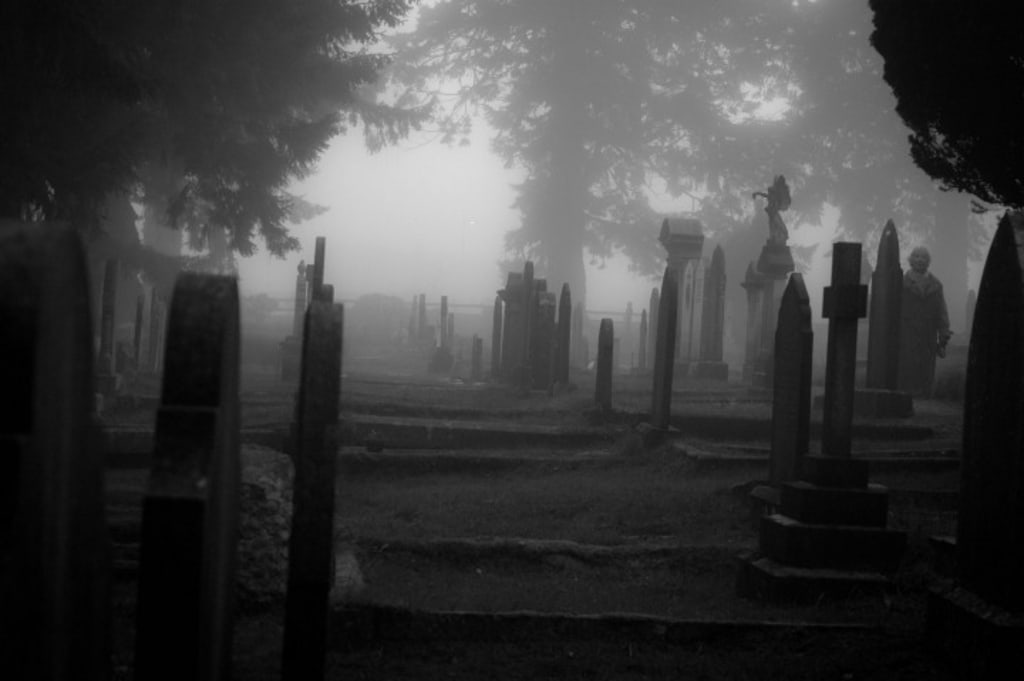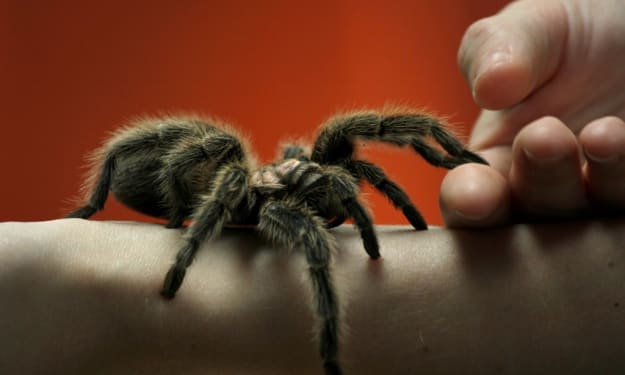Do You Believe In Ghosts?
Faith in the supernatural is common, but is it reasonable?

In the spirit of spooky season, I thought it worth tackling the rarely challenged assertion on the existence of ghosts. The findings of Pew Research in 2009 suggest around 18% of people in the United States claim to have seen a ghost. 18% is no small figure at over 50 million people in the United States who actively claim to have seen spirits. A greater number of U.S. citizens claim to believe in ghosts, at around 41% according to a YouGov study. That’s almost half of the population.
This high percentage figure might have been acceptable in the past, previous to digital technology. In modern times, just about every citizen of the world has a smartphone equipped with a camera capable of recording experiences. It takes just a few moments of fiddling. The ability to use these devices to record and browse endless digital libraries puts the concept of ghosts in doubt. We no longer rely on rumors or fleeting bits of news shouted from public squares. Technology has changed everything. It’s made access to information quicker and easier. Despite this, we have no better evidence for the existence of anything supernatural than we did 100 years ago. Why is that?
Some might think it’s because spirits are elusive or incapable of being measured on any technological device. Plenty of others think differently, that ghosts can and have been measured on devices already. There’s an abundance of evidence scattered across the internet to support the existence of ghosts. But is there?
If you go to YouTube and type in ‘evidence for ghosts, you’ll face many pages of videos featuring people screaming at shadows and dark empty hallways. These videos are quick to inform the viewer that any odd occurrence captured on film or through microphones is a ghost. Many videos incorporate lazy digital effects to create a ghost that any individual with a half-functioning brain can identify as fakery. Some are more convincing, drawing the attention of VFX artists or scientists who debunk the videos to explain what is happening.
But what does the science say on the matter? For many years, the James Randi Educational Foundation offered a one million dollar prize to anybody willing and able to show genuine paranormal phenomena under controlled conditions. Surprise, surprise, nobody ever collected. Some will interpret this as a defeat of ghostly claims, while others will staunchly maintain that ghosts cannot be detected under controlled conditions. How convenient. I guess ghosts are shy. There are numerous investigations into paranormal phenomena but still no good evidence.
The argument that technology can’t detect ghostly phenomena is self-defeating. A phenomenon either manifests in reality or doesn’t. If you’re arguing for phenomena that manifest in reality, then they should be detectable. At the very least, if it can’t be detected directly, the interactions it might have within reality would be able to be observed. If the phenomenon does not manifest, it cannot be investigated; there’s no reason to suggest ghosts exist. Perhaps you believe that ghostly phenomenon manifests, but only biological senses can detect it. Maybe so, but I doubt you have sufficient evidence to support this assertion. I also suspect you lack an explanation ruling out the ability of technology to record this phenomenon. You’re leaning on personal experience, which is notoriously unreliable.
Belief in ghosts always rests on personal experience. “I had this experience and it was a ghost.” How did they determine it was a ghost? They didn’t conduct any tests or attempt to rule out other explanations. They jump to a specific cause because of social priming. They categorize odd experiences as supernatural because of their association with the unknown. This also happens with unidentified flying objects. Must be aliens!
A mysterious glowing orb in a photo? That’s a ghost. Not a speck of dust. Not an out-of-focus flying insect or floating particulate. Ghost. A door slamming in the night wasn’t the result of a draft or the flexing of wood and an unlevel hinge. It must be a ghost (obviously). The opaque humanoid figure walking down the hallway wasn’t the result of a semi-dream state or unusual light refraction, because that’s a ghost too! What process did they use to form these conclusions? This reasoning is not scientific.
Ghosts, in my opinion, are much like gods. Sometimes we have experiences that we don’t understand or fail to explain, so we unjustly attach an explanation anyway. Ghosts represent gaps in our knowledge. These knowledge gaps are confusing to most of us. We hate not knowing the reasons for events that confound our senses. We fill these knowledge gaps to please our desire for comfort. Whether it be questions like “How did the universe begin?”, or “Why do we humans exist?” or something more trivial like “What made that bump in the night?” these questions speaks to our desire to understand the unknown world around us. The popular explanations to those questions fill in those gaps of knowledge, even when they shouldn’t.
Not knowing what caused that glass to fall from the counter and shatter in the dead of night is far more terrifying than its attribution to a ghost. It’s the base recipe for good horror. Keep your audience in suspense about the unknown, because the unknown is horrifying. The moment you explain what is going on, the story loses steam. The moment you reveal your monster, the audience begins to lose interest. That’s why the big reveal tends to happen closer to the end of a film. In fiction, this works well. But in reality, it’s uncomfortable.
This common belief in ghosts in our society is heavily reminiscent of faith. I define faith as a belief without evidence. People have faith in ghosts like they have faith in gods. Their motivations are different, but there are overlaps. For example, faith in religion and ghosts have the greatest unknown in common, death.
Where do you go when you die? For many people of faith, it’s satisfying to believe that when you die, you go to Heaven as is common in Abrahamic faiths. For Hindu faith, that’s reincarnation. In both faiths, your spirit or soul continues post-death. Ghosts are the lingering ‘essence’ of a person. This is often described negatively as being ‘stuck’, and incapable of ‘moving on.’ The language here betrays the motivation for belief. Despite the negative association, the idea that death isn’t the end of life, but something different, something more is pleasing. And there’s an upside. Something stuck in place can be dislodged. Ghosts can move on with the right ‘push’. For many, this sort of belief could be as satisfying as a belief in a religious afterlife. It’s reasonable to think that existing in some form is preferable to non-existence. Non-existence is frightening. It’s unknown.
It shouldn’t be surprising to learn that belief in deities and ghosts overlap. A YouGov poll demonstrates that more than 50% of believers in Abrahamic religion also believe in ghosts. Is this a product of faith? I think so. Despite a lack of evidence for ghosts, the belief holds firm sway over the population. It begs the question, is there any belief that faith cannot justify? It‘s through faith that every religion supports its deities and associated mythology. Faith can support any belief. If faith supports all beliefs, how does faith offer valid and accurate knowledge? This demonstrates the necessity for evidence. It’s why experts follow the scientific method to answer life’s most difficult questions. Faith does not lend valuable knowledge. Faith provides comfort and does so in the areas of life that we can’t (yet) explain through science. Death is the primary driver of faith in both religion and the supernatural. People seek the comfort of “knowing” that paradise awaits them and that death isn’t the end.
There’s little doubt that ghosts have left an impression on society, but in my view, the belief is best left to fiction. Ghosts haven’t earned your belief. As satisfying as it may be to hope for life after death, I encourage a pragmatic consideration of the evidence or lack thereof. I’m not suggesting anybody stop their search for the supernatural. I’m merely requesting that humanity withholds belief in the supernatural until there is enough evidence in its favor. Be skeptical.
References
Ballard, J. (2020, October 30). About half of Americans believe ghosts and demons exist. YouGov. Retrieved October 10, 2022, from https://today.yougov.com/topics/society/articles-reports/2020/10/30/ghosts-demons-exist-poll-data
Ballard, J. (2021, October 21). Two in five Americans say ghosts exist — and one in five say they’ve encountered one. YouGov. Retrieved October 10, 2022, from https://today.yougov.com/topics/entertainment/articles-reports/2021/10/21/americans-say-ghosts-exist-seen-a-ghost
Lipka, M. (2020, May 30). 18% of Americans say they’ve seen a ghost. Pew Research Center. Retrieved October 10, 2022, from https://www.pewresearch.org/fact-tank/2015/10/30/18-of-americans-say-theyve-seen-a-ghost/
Staff, W. I. R. E. D. (2007, January 12). Skeptic revamps $1M psychic prize. Wired. Retrieved October 10, 2022, from https://www.wired.com/2007/01/skeptic-revamps-1m-psychic-prize/
About the Creator
David Weis
I am an atheist, liberal, humanist and skeptic. I care about the world and want to change it for the better and hopefully improve societal well-being along the way. I'm interested in science, history and mythology.
Reader insights
Outstanding
Excellent work. Looking forward to reading more!
Top insights
Eye opening
Niche topic & fresh perspectives
On-point and relevant
Writing reflected the title & theme






Comments (1)
It is so hard to stay skeptical when you feel sensations that are hard to explain. The feeling of the unknown is so powerful. Great post, thank you for sharing!